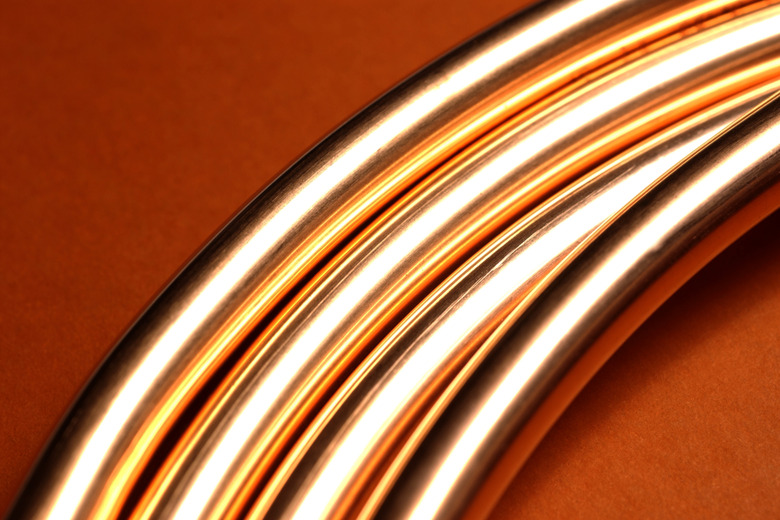Does Copper Explode?
Although copper is chemically active, readily combining with oxygen and other elements, under most circumstances these reactions occur relatively slowly and are not explosive. This is in contrast to alkali metals such as cesium and sodium, which react violently with water. Although metallic copper is safe to store, handle and use under most circumstances, some of its compounds are explosive.
Explosive Reactions
Explosive Reactions
Explosive chemical reactions occur when compounds undergo a rapid, violent release of energy. An explosive compound may be nominally stable, but a triggering event, such as a mechanical or electrical shock, breaks chemical bonds in the substance. When this happens, some of the molecules release energy, which sets off a chain reaction in neighboring molecules. This occurs at high speed, consuming the explosive substance in a few thousandths of a second and releasing energy as a shock wave.
Copper Compounds and Hydrogen Peroxide
Copper Compounds and Hydrogen Peroxide
Compounds such as copper acetylide have explosive properties, even though metallic copper does not. Copper atoms combine with acetylene, a highly combustible gas used in welding, to form copper acetylide. The compound reacts with water, releasing the gas and creating an explosion hazard. Copper tetrammine is another compound with the potential for explosion. In addition, metallic copper causes the explosive decomposition of hydrogen peroxide when the solution has a concentration of 30 percent or greater.
Copper Thermite
Copper Thermite
A family of substances called "thermite," while not explosive, produce enormous amounts of heat with temperatures of approximately 3,700 degrees Celsius (6,700 degrees Fahrenheit). Thermite is used to safely destroy land mines and to weld railroad rails. The substance consists of mixed fine metal powders; when ignited, one of the metals releases oxygen, and an aluminum powder absorbs it, giving off heat. One type of thermite employs powdered copper, an easily obtained alternative to powdered iron.
High Magnetic Fields
High Magnetic Fields
The forces inside high-powered experimental electromagnets are high enough to explode the copper windings that make the magnets work. When electricity flows through a wire, it produces a magnetic field around the wire. However, the forces between adjacent windings in a large electromagnet push against each other, producing stress in the wire. In most electromagnets, the forces are not strong enough to damage the windings, but the forces become larger as electrical currents increase. Experimental electromagnets have fields approaching 100 tesla — about 30 times as strong as the powerful magnets used in magnetic resonance imaging (MRI) machines. Scientists run the magnets only for only two-hundredths of a second to prevent the copper windings from exploding.
References
- University of California: Group 1: The Alkali Metals
- Helmholtz Zentrum Dresden Rossendorf: The Highest Magnetic Fields Are Created in Dresden
- Defense Technical Information Center: Deflagration Systems Neutralize Hard Case Mines [PDF]
- Hong Kong University of Science and Technology: Shock Sensitive and Explosive Chemicals
- University of North Carolina: Explosive and Reactive Chemical Hazards [PDF]
Cite This Article
MLA
Papiewski, John. "Does Copper Explode?" sciencing.com, https://www.sciencing.com/copper-explode-16298/. 24 April 2017.
APA
Papiewski, John. (2017, April 24). Does Copper Explode?. sciencing.com. Retrieved from https://www.sciencing.com/copper-explode-16298/
Chicago
Papiewski, John. Does Copper Explode? last modified March 24, 2022. https://www.sciencing.com/copper-explode-16298/
